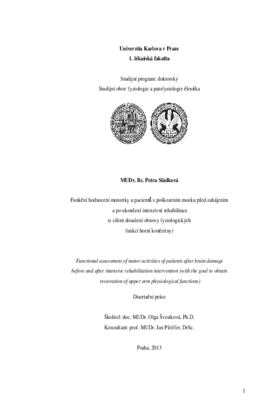Funkční hodnocení motoriky u pacientů s poškozením mozku před zahájením a po ukončení intenzivní rehabilitace (s cílem dosažení obnovy fyziologických funkcí horní končetiny)
Functional assessment of motor activities of patients after brain damage before and after intensive rehabilitation intervention (with the goal to obtain restoration of upper arm physiological functions)
dizertační práce (OBHÁJENO)

Zobrazit/
Trvalý odkaz
http://hdl.handle.net/20.500.11956/58954Identifikátory
SIS: 141448
Katalog UK: 990016783530106986
Kolekce
- Kvalifikační práce [4899]
Autor
Vedoucí práce
Oponent práce
Jeřábek, Jaroslav
Kozler, Petr
Fakulta / součást
1. lékařská fakulta
Obor
-
Katedra / ústav / klinika
Klinika rehabilitačního lékařství 1. LF UK a VFN v Praze
Datum obhajoby
12. 12. 2013
Nakladatel
Univerzita Karlova, 1. lékařská fakultaJazyk
Čeština
Známka
Prospěl/a
Klíčová slova (česky)
multidisciplinární rehabilitace, pohybový vzorec, akcelerometr, funkční objektivní hodnocení, poškození mozku, centrální hemiparéza, plasticita mozkuKlíčová slova (anglicky)
multidisciplinary rehabilitation, movement pattern, accelerometer, functional objective assessment, brain damage, central hemiparesis, brain plasticity5 Abstrakt Rehabilitace pacientů po poškození mozku je interprofesní, komplexní, intenzivní, dlouhodobý a individuálně zaměřený proces. Častý následek poškození mozku je hemiparéza, která způsobuje i poruchu pohybového vzorce horní končetiny. Schopnost pohybu horní končetiny je zásadní pro soběstačnost jedince, provádění běžných denních činností, a tím i nezávislý život v rodinném prostředí. Speciální rehabilitační terapeutické přístupy by měly zahrnovat nácvik nových činností, včetně mechanismu motorického učení, které způsobí aktivaci plasticity mozku. Dochází k funkční reorganizaci oblasti motorické kůry, aktivaci rezervních neuronů a náhradě poškozených spojů. Jedním z cílů práce bylo prokázat objektivními funkčními metodami možnost ovlivnění pohybového vzorce paretické horní končetiny intenzivní interprofesní rehabilitací i několik let po poškození mozku. Druhým cílem bylo prokázat, že monitoring pohybových funkcí u pacientů po poškození mozku vede ke zlepšení motivace a tím ke zlepšení pohybových funkcí. Studie byla provedena u 55 vybraných pacientů po poškození mozku s centrální hemiparézou, kteří se účastnili 4 týdenního pobytu v rehabilitačním denním stacionáři. Byly sledovány 2 skupiny pacientů, s akcelerometrem (30 pacientů - skupina A) a bez akcelerometru (25 pacientů - skupina B). Parametrem...
6 Abstract The rehabilitation of patients with brain damage is an interprofessional, complex, intensive, long-lasting and individually oriented process. One frequent consequence of brain damage is hemiparesis, which also causes a disorder of the upper extremity movement pattern. The movement ability of the upper extremity is essential for an individual's self-sufficiency, the performance of common daily activities, and thus for an independent life in a family setting. Special therapeutic rehabilitation approaches should involve the training of new activities, including the motor learning mechanism that activates brain plasticity. A functional reorganization of the motor cortex occurs along with the activation of reserve neurons and the replacement of damaged synapses. One of the aims of this work was to demonstrate, using objective function methods, the possibility of influencing the movement patterns of a paretic upper extremity by means of intensive interprofessional rehabilitation even several years after the brain damage. The second aim was to demonstrate that the monitoring of motor functions in patients after brain damage leads to improved motivation, thereby improving motor functions. A study was conducted among 55 selected patients after brain damage with central hemiparesis who participated in the...
